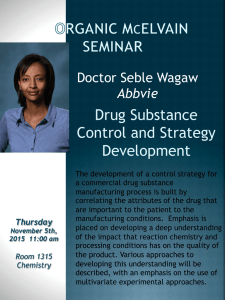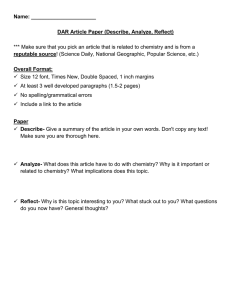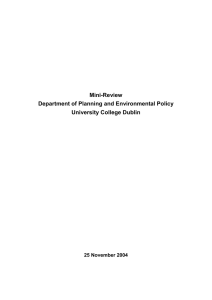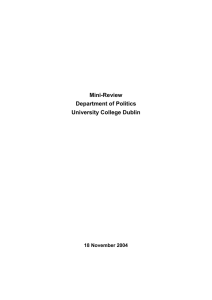Department of Chemistry (11/2004) (opens in a new window)
advertisement
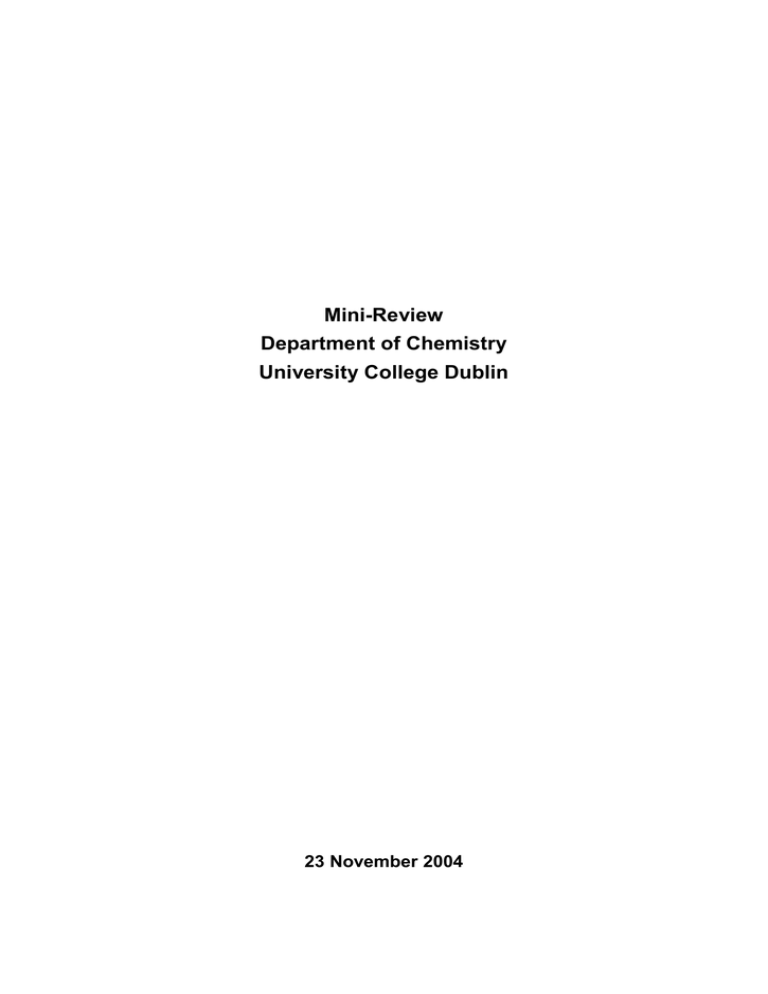
Mini-Review Department of Chemistry University College Dublin 23 November 2004 The Review Members of Review Group Professor Michael Monaghan Professor Maurice Boland Dr Valerie Richardson Ms Elaine Cox Department of Large Animal Clinical Studies Dean, Faculty of Agri-Food and Environment Department of Social Policy and Social Work Quality Assurance Office Chair Methodology The Mini-Review Group (MRG) visited the Department of Chemistry on Tuesday, 23 November 2004. In preparation for the visit the MRG reviewed the following documents supplied by the Department: Mini-Review Progress Report Peer Review Group Report Self-assessment Report Quality Improvement Plan Supplement to the Department’s Quality Improvement Plan During the visit the MRG met with the Head of Department, academic staff, administrative staff, technicians, student representatives and the Dean of the Faculty of Science. The size of the Department (and the scale of its activities) and the absence of any expertise in Chemistry in the MRG meant that most of the discussion centred on issues of planning and organisation within the Department. Findings of the Mini-Review Group 1) General Comments We acknowledge that there was some delay in the development of the Department’s Quality Improvement Plan, but it is clear that the Department has made substantial progress since the submission of the Peer Review Group Report in 1999. The appointment of Professor McGlinchey as Head of Department brought a clear strategic focus to the Department’s ambitions to be a ‘Top Fifty’ Chemistry department. 2) Planning and Organisation General While the MRG acknowledge the advances made in the Department towards developing a more strategic approach to its future development, the 2 Chemistry Department does not currently have a formal Strategic Development Plan. It is clear that the Department now has a strong and forceful leadership in place. The Department has a good understanding of the external environment in which it operates. The process of developing a formal plan for the Department needs to commence immediately and the involvement of all academic staff, with inputs from support staff, is required to identify the real strengths of the Department and the steps required for it to achieve its ambitious targets. The Department should consider retaining some outside help with facilitation of the early meetings during this process. The introduction of regular, fixed staff meetings with an agenda and minutes, to include technical, administrative and academic staff would go a considerable way towards fostering a climate in which real dialogue can take place. We recommend that the Department hold such meetings at a regular time on a monthly basis. The MRG came away with a clear impression of three clearly delineated sections within the Department. The Head of Department expressed the view that the boundaries between these sections need to be more porous to foster greater collaboration and the group endorses this view; this would apply even more if the Department were to develop alliances or engage in mergers with other groupings in the Faculty. There was some disagreement on the extent of the transparency of the financial affairs of the Department and dissatisfaction was expressed by some on the way the historical Departmental overspend was being addressed. The MRG recommends that Departmental finances be a regular agenda item for Departmental meetings. Physical Improvements The major physical improvement will be the CSCB when it becomes operational. Resources There is still a significant sense of frustration felt in the Department, particularly by technical and administrative staff. It is essential that the views of such staff are sought and included in the decision-making activities within the Department. The administrative staff feel overworked with two posts in the office unfilled and describe an inability to deal with the many decisions required. Means to alleviate this must be put in place. Inclusion of both technical and administrative personnel on Department committees would alleviate some of the frustration. There is frustration on the academic side from the perception that outside monies (eg PRTLI) have been used to avoid making academic replacements. There is a need to plan on replacement of infrastructure that is becoming dated, particularly in relation to teaching. 3 Facilities Substantial improvements have taken place in the provision of equipment since the PRG Report, although there are many other infra-structural issues to be addressed. 3) Teaching & Learning Course Content While acknowledging that the curriculum was already very good, the PRG Report highlighted the need for any Strategic Development Plan to include the development of policies regarding Teaching and Learning at each undergraduate stage and at postgraduate level. In addition the Department needed to design a comprehensive training programme for postgraduate students in analytical techniques, measurement, instrumentation and computation. The PRG Report also commented that the teaching of Chemistry was undertaken in a very traditional and conservative manner. They also drew attention to insufficient adoption of computer technology in the Department as a whole and in particular in laboratory teaching which was also hampered by the overall shabby nature of the laboratories. The Chemistry Department must be commended for their efforts in addressing the comments made by the PRG in relation to Teaching and Learning. The Department had become very concerned with the drop in the recruitment of students into Chemistry and consequently were forced to address the question of how to provide courses in First and Second Science which would attract students to continue with Chemistry to final year. Consequently the Department carried out a radical review of the First Year course structure and curriculum which places an increased emphasis on Biological Chemistry. The accompanying laboratory course has been completely rewritten and is tied to the lecture course with the corresponding lecturer supervising their own laboratory section. However, there is some disquiet concerning uneven distribution of teaching workloads, especially in relation to supervision of practical classes. There have also been major developments in Second Year Chemistry course. Many of these changes were as a consequence of the changes in the First Year programme. One of the most significant changes has been in the practical courses. There has been a reorganisation of the laboratories leading to more efficient use of time slots. A further improvement has resulted from unitising the programme into four consecutive sections, with the practicals running concurrently with the relevant units. The student numbers in Second Chemistry have increased by almost 40%. The Third Year course programme is still under active discussion and will be addressed with the introduction of semesterisation and modularisation. A new course in Materials Chemistry was introduced this year and a more comprehensive tutorial scheme has been initiated. The Fourth Year programme is due to undergo structural changes during the current academic year. This includes the setting up of a tutorial system to 4 assist the students in consolidating their basic knowledge and problem solving skills. It is evident that the Department has made considerable progress in developing the Teaching and Learning aspects of its mission. However, a more coordinated approach is needed particularly in regard to planning new courses or expanding courses. This is particularly important if the Department intends to move towards building more joint programmes with other departments and faculties. In addition, best practice would indicate that students require clear learning objectives for each course at its commencement. The Department should develop a Teaching and Learning strategy which include programmes for staff development and should consider setting up a staff mentoring programme for new staff. Teaching Methods: The Department took seriously the PRG criticism of the teaching methods employed in the delivery of courses and has introduced radical changes with the use of computer technology in the lectures and laboratories. However, the students who spoke to the MRG and some of the staff voiced some reservations concerning the wholesale use of this method in so far as they believe that it is not necessarily suitable for the learning of all subject areas. They argued that in dealing with problem solving it can be more beneficial to witness the solving of problems in action using traditional methods. The postgraduate students who are taking tutorial and lab sessions felt that the Department had made great advances in the teaching methods but also expressed the view that access to all the material on the Web had unintended consequences in so far as it seemed to limit the development of critical thinking particularly in laboratory sessions. It was their view that the new teaching methods had led to students learning more factual information but glossing over the conceptual aspects of the subject. As they put it: ‘Chemistry is made more friendly for the students but the students can’t think anymore’. They emphasised the need for the Department to establish ways to encourage more critical thinking among the students and suggested that this could be achieved through greater use of the tutorial system. Graduate School of Chemistry The Department is to be commended for developing its plans to set up a Graduate School of Chemistry. Such a development would be in line with Chemistry Departments in the most prestigious universities. In addition it would provide a pool of highly qualified graduate students who would be available to contribute to the undergraduate teaching programme with a reduction in costs to the Supplies and Travel (S&T) Budget. The Department should continue to plan to develop its Graduate School of Chemistry. 5 4) Research A written strategic plan in relation to research programme(s) in the Department does not currently exist. Such a plan would focus the research output and could lead to better synergy between the current three sections in the Department. A clear plan is required and the development of this plan requires input from as wide a constituency as possible, in particular from the younger members of the academic community. Many of the elements for this plan are there, such as the desire to link up with other departments, the expectation of scientific outputs, the desire to have a Graduate School, and the ambition to be the leading Chemistry department in this country. Currently there is not a Departmental approach to funding applications; it is possible that benefits may accrue from such an approach. We suggest the Department create a position for a Research Manager/Coordinator to coordinate research proposals and manage research accounts as part of the review of the Department’s Administration Office. The Department’s research profile has improved significantly in recent years. A group of three scientists raised €26m under the PRTLI programmes for the Centre for Synthesis and Chemical Biology (CSCB). This provides not only a building, but also equipment (NMR, Mass spectrometry and X-ray crystallography) and personnel. There is a feeling in the group that some personnel hired under this funding are being used as a substitute for nonreplacement of other Department staff. The relationship between the CSCB and the Department needs to be clarified. While the CSCB has been very successful to date, it will require strong support/buy-in from the Department if it is to develop to its potential maximum. Research funding from SFI and other sources contributes in a major way to the scientific output of the Department. The population of postdoctoral fellows has increased significantly during the past five years. The research output (quality and quantity) will expand further provided that a balance is achieved across the Department using an appropriate workload allocation model. It is imperative that staff that are most active in research (raising funds and publishing) are not overburdened with teaching duties relative to other more senior staff that have a lighter teaching load; this must be addressed carefully by the Head of Department. 5) Faculty and University Support The major achievement of the past five years has been the successful bid for PRTLI funds for the CSCB and the Department has also had notable successes in attracting other research funds. The Dean explained that the Department had overspent its budget for many years, but that this is now under control by methods agreed with the Head of Department. 6 There is disagreement about the S&T Budget; the Department’s view is that it has not changed for many years; the Dean believes this perception is related to the control measures instituted to deal with the historical Department overspend. Recommendations of the Mini-Review Group The Department should embark without delay on the process of developing a formal Strategic Development Plan which will describe teaching and research priorities. The planning process should encourage as much dialogue as possible across the major Departmental disciplines. A pattern of regular scheduled Departmental meetings (to include academic, administrative and technical staff) should be established without delay. These meetings should have short agendas, all participants should be invited to suggest agenda items and it should be clear from the minutes what follow-up actions are required. The Departmental budget should be discussed at these meetings. The Department should find a way of dealing with the feelings of exclusion from planning and decision-making being experienced by the technicians. The Department needs to have frank discussions about its relationship with the CSCB and how this new entity fits with Departmental plans. The Department needs to address perceived variability in teaching workloads. An equitable workload allocation model should be introduced. The Department needs to break down the boundaries between the three sections (Physical, Organic and Inorganic). The Head of Department and Dean need to resolve the difficulties regarding staffing in the administrative office. The Department should continue to refine and develop its greatly improved Teaching and Learning programme. 7


